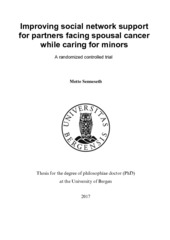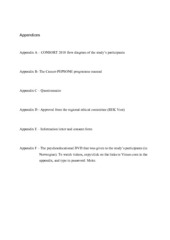| dc.description.abstract | This is a study of the impact of a psycho-educational social support intervention on partners’ social support and well-being in the face of spousal cancer. The study is part of the larger Cancer-PEPSONE study conducted at the Center for Crisis Psychology (CCP) in Bergen, of which the overall aim is to secure children's safety and quality of life (QOL) when living with parental cancer. The present study’s focus is the partners who concomitantly are caring for minors (the “well parents”). The adverse effects of spousal cancer on partners’ health and well-being are heavily documented and may affect the well parents’ parental capacity. Social support has the potential to reduce the negative impacts of stress on health and well-being, and may be of special value for well parents who are heavily burdened while juggling multiple caregiver roles. Untapped support resources may exist in their informal social networks. However, well parents experience difficulties in initiating support and sustaining support over time, while members of these social networks are often unsure of their supportive roles and call for advice and open communication with the affected families so as to be empowered as supporters. Still, no existing interventions seem to target the enhancement of social networks’ support of families facing cancer, and research on this topic is scarce. Accordingly, the Cancer-PEPSONE programme (CPP), which is a psycho-educational intervention that covers these families and their social networks, was developed in Norway. CPP is a manual-based and home-based single-session intervention, provided by a psychologist. The main aim of the present study was to assess the impact of CPP on the social support received and perceived by well parents, as well as their psychological distress, QOL and parental self-efficacy. Furthermore, the study aimed to explore the well parents’ levels of psychological distress, QOL, social support and hardiness, and to explore the relationship between these variables. The study was an open, single-centre randomized controlled trial (RCT) with a longitudinal design, including an intervention group and a control group. The sample consisted of 35 well parents who were living with a partner suffering from cancer while caring for at least one minor child (<18 years of age). The intervention group (N=17) received CPP together with their selected social network members, while the control group (N=18) received support as usual from their social networks. Data were collected at three time points: baseline (T1), three-month follow-up (T2, approximately one month after the CPP intervention), and six-month follow-up (T3, approximately four months after the CPP intervention). Data were obtained using validated questionnaires. Based on the study’s baseline data, Paper 1 explored the social support, psychological distress, QOL and hardiness of well parents (N=35). Fifty percent of well parents reported symptoms of psychological distress above the cut-off value for probable psychological illness, which may indicate the need for psychological treatment. Well parents’ psychological distress seemed to be associated with their not being in control of their futures. Well parents seemed to have QOL impairments as compared to the QOL of the healthy Norwegian adult population and non-parental caregivers in Norway. Supporting the stress-buffering hypothesis, multiple regression analyses found that the social support provided by social networks seemed to buffer the adverse effects of psychological distress on well parents’ QOL. QOL acted as a mediator between personal resilience qualities (hardiness) and psychological distress, meaning that hardiness influenced psychological distress through QOL. Paper 2 focused on the first two waves (T1 and T2), analysing the short-term effects of CPP, as assessed one month after the intervention. Findings from repeated measures multivariate analyses of covariance (MANCOVA) revealed that the intervention group experienced increased levels of received and perceived social support after one month. This finding was contrasted with a significant decrease in social support for controls. Results did not prove any short-term effects on well parents’ psychological distress and QOL. However, a multiple regression analysis suggested that CPP might have an indirect effect on well parents’ QOL through the improvement of social support. Paper 3 focused on all three waves (T1-T3), analysing the four-month effects of CPP using linear mixed models (LMM) analysis. After four months, CPP seemed effective in sustaining well parents’ received and perceived social support, as well as enhancing their parental self-efficacy. Results did not prove any intervention effects on well parents’ psychological distress or QOL. However, a multiple regression analysis suggested that CPP might have an indirect effect on well parents’ psychological distress through the improvement of social support. To summarize, the study found that the well parents are largely distressed and that their QOL is at risk, but that social support may buffer the negative consequences of their psychological distress on their QOL. Healthcare professionals ought to have a special focus on these well parents, particularly given that their psychological distress and QOL impairments may affect their capacity to care for their children. Furthermore, healthcare professionals need to acknowledge social support as an important factor for well parents’ well-being and help facilitate the optimization of this social support. CPP seems to help improve and sustain social support for the well parents as well as enhancing their parental self-efficacy. Hence, CPP seems to address a gap in the existing psychosocial interventions. These are encouraging results and may be beneficial for the well-being of both well parents’ and their children. Nonetheless, a follow-up CPP session may be required in the programme to optimize social support in the longer-term for the well parents. Furthermore, a larger focus on practical support may be required to better target well parents’ psychological distress and QOL. Considering the study’s small sample size, these results call for confirmation in future studies with larger sample sizes. | en_US |
| dc.relation.haspart | Paper 1: Senneseth M, Hauken M, Matthiesen SB, Gjestad R, Laberg JC. Facing spousal cancer during child-rearing years: do social support and hardiness moderate the impact of psychological distress on quality of life? Cancer Nursing, 2017;40(3):E24–E34. The article is not available in BORA due to publisher restrictions. The published version is available at: <a href="https://doi.org/10.1097/ncc.0000000000000379" target="blank">https://doi.org/10.1097/ncc.0000000000000379</a> | eng |
| dc.relation.haspart | Paper 2: Senneseth M, Dyregrov A, Laberg JC, Matthiesen SB, Pereira M, Hauken M. Facing spousal cancer during child-rearing years: the short-term effects of the Cancer-PEPSONE programme – a single-center randomized controlled trial. Psycho-Oncology, 2017;26(10):1541-1547. The article is not available in BORA due to publisher restrictions. The published version is available at: <a href=" https://doi.org/10.1002/pon.4329" target="blank"> https://doi.org/10.1002/pon.4329</a> | eng |

